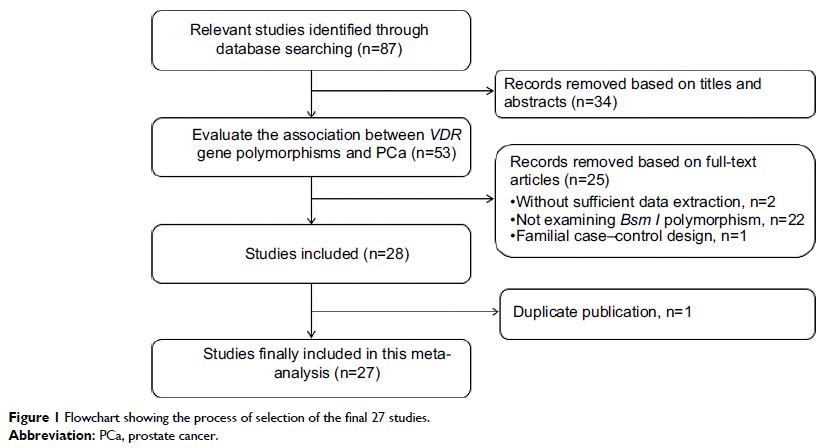108384
论文已发表
注册即可获取德孚的最新动态
IF 收录期刊
- 3.4 Breast Cancer (Dove Med Press)
- 3.2 Clin Epidemiol
- 2.6 Cancer Manag Res
- 2.9 Infect Drug Resist
- 3.7 Clin Interv Aging
- 5.1 Drug Des Dev Ther
- 3.1 Int J Chronic Obstr
- 6.6 Int J Nanomed
- 2.6 Int J Women's Health
- 2.9 Neuropsych Dis Treat
- 2.8 OncoTargets Ther
- 2.0 Patient Prefer Adher
- 2.2 Ther Clin Risk Manag
- 2.5 J Pain Res
- 3.0 Diabet Metab Synd Ob
- 3.2 Psychol Res Behav Ma
- 3.4 Nat Sci Sleep
- 1.8 Pharmgenomics Pers Med
- 2.0 Risk Manag Healthc Policy
- 4.1 J Inflamm Res
- 2.0 Int J Gen Med
- 3.4 J Hepatocell Carcinoma
- 3.0 J Asthma Allergy
- 2.2 Clin Cosmet Investig Dermatol
- 2.4 J Multidiscip Healthc

前列腺癌风险和维生素 D 受体 Bsm I 多态性之间缺乏联系:基于 27 篇已发表的研究的综合分析
Authors Kang S, Zhao Y, Wang L, Liu J, Chen X, Liu X, Shi Z, Gao W, Cao F
Received 16 April 2018
Accepted for publication 20 May 2018
Published 1 August 2018 Volume 2018:10 Pages 2377—2387
DOI https://doi.org/10.2147/CMAR.S171305
Checked for plagiarism Yes
Review by Single-blind
Peer reviewers approved by Dr Colin Mak
Peer reviewer comments 2
Editor who approved publication: Professor Nakshatri
Background: The association between vitamin D receptor gene Bsm I (rs1544410)
polymorphism and prostate cancer (PCa) risk has been investigated by numerous
previous studies, which yielded inconsistent results. We conducted this
meta-analysis to derive a relatively precise description of this association.
Methods: All studies published up to December 2017 were identified via a
systematic search of PubMed, Embase, and China National Knowledge
Infrastructure databases. Pooled odds ratios (ORs) with their 95% confidence
intervals (CIs) were estimated to describe the strength of the relationship
between Bsm I and PCa risk.
Results: In this meta-analysis, 27 studies with 9,993 cases and 9,345
controls were included. The pooled results revealed that Bsm I polymorphism was not
associated with PCa risk in the overall analysis. Moreover, no significant
relationship was found in the subgroup analyses by ethnicities, genotyping
methods, Hardy–Weinberg equilibrium status, and Gleason score. In the
stratified analysis by the source of controls and clinical stages, controls of
benign prostatic hyperplasia (BPH) seemed to be in the particular groups in
which the association of PCa risk with Bsm I polymorphism
was significant (Bb vs. bb: OR=0.643, 95% CI=0.436–0.949, p =0.026; BB/Bb vs. bb: OR=0.627,
95% CI=0.411–0.954, p =0.029; B vs. b:
OR=0.715, 95% CI=0.530–0.965, p =0.029).
Conclusion: Our results suggest that Bsm I polymorphism
is weakly associated with PCa risk, and hence, it cannot be considered as a
predictor of the occurrence and development of PCa in clinical practice. Future
studies with a larger number of samples are needed to verify our results.
Keywords: Bsm I , prostate cancer, vitamin D
receptor, polymorphisms, meta-analysis
